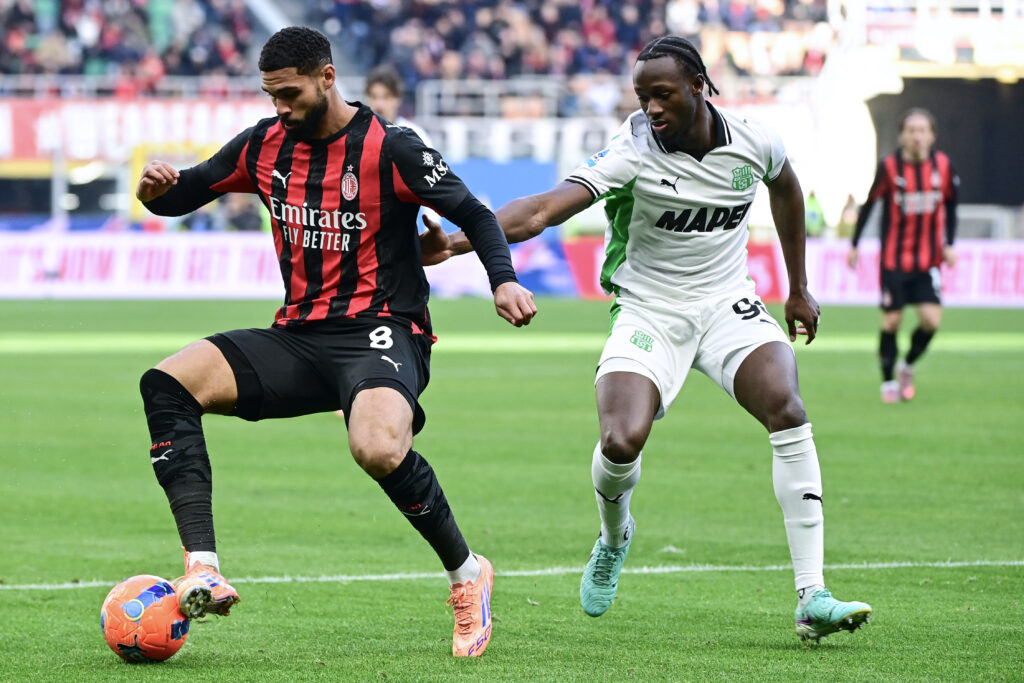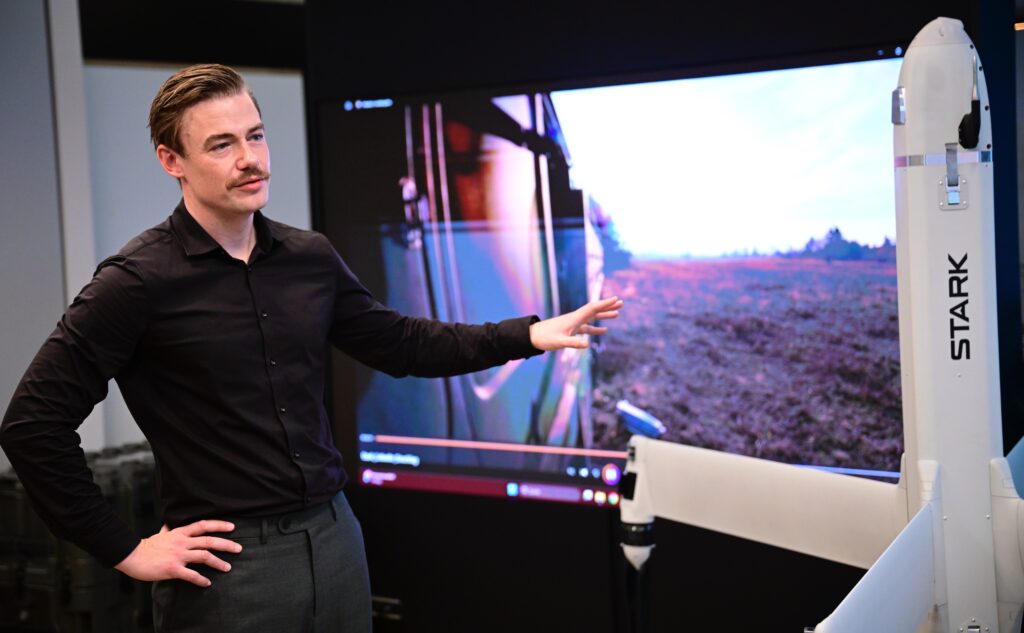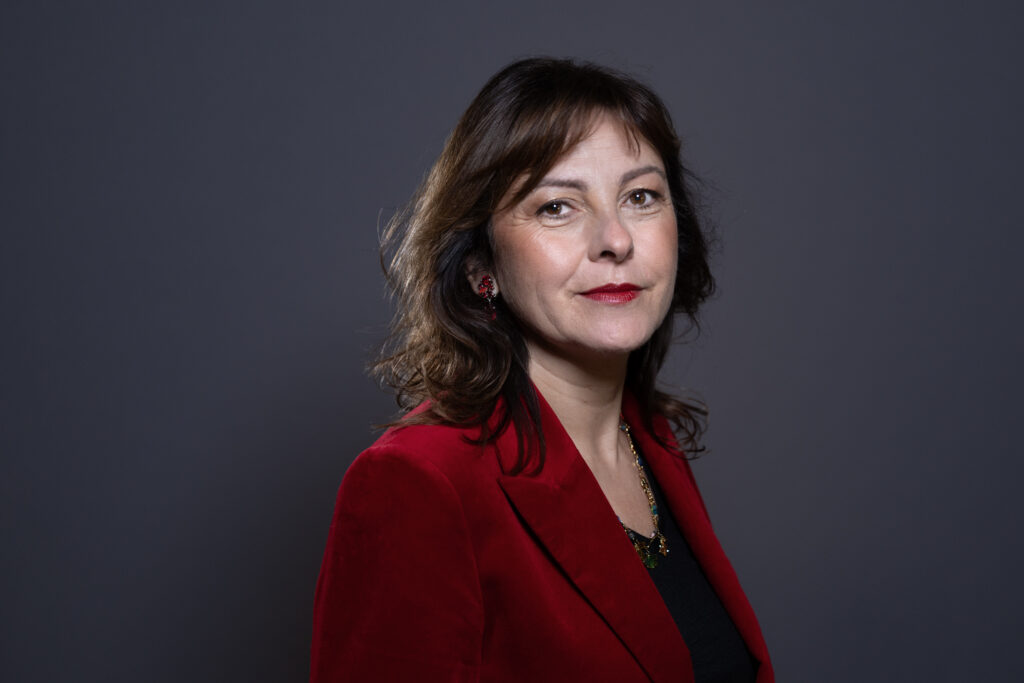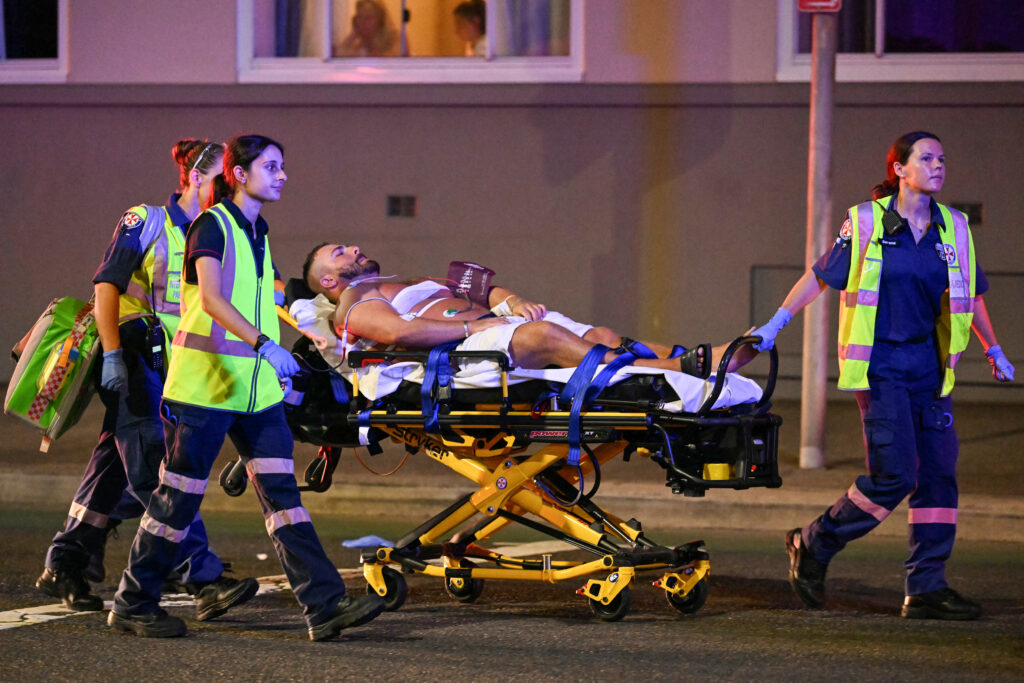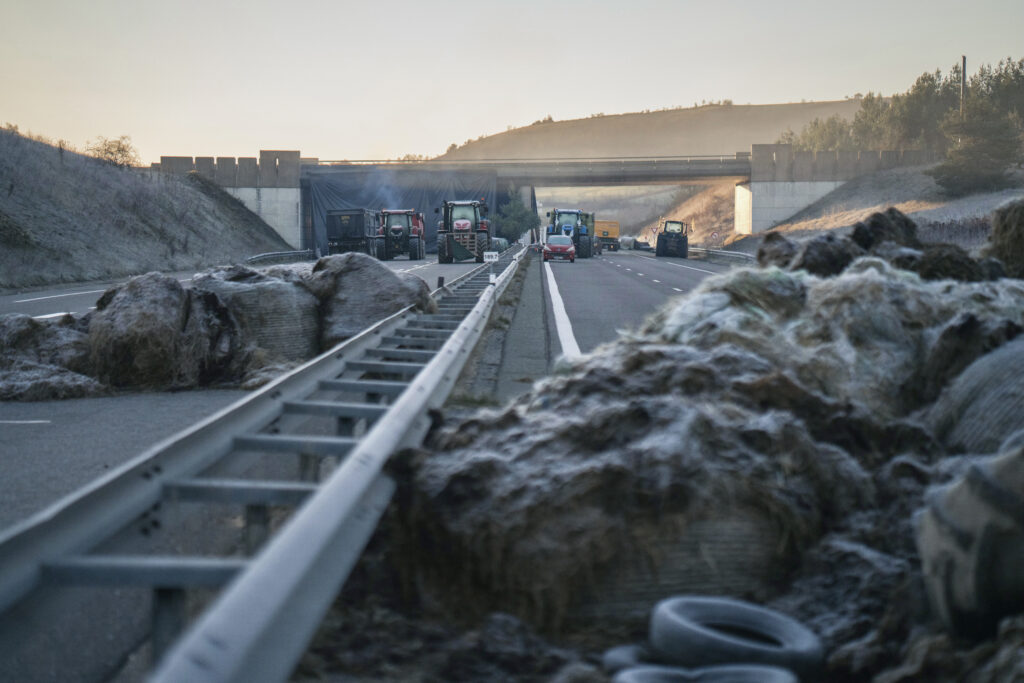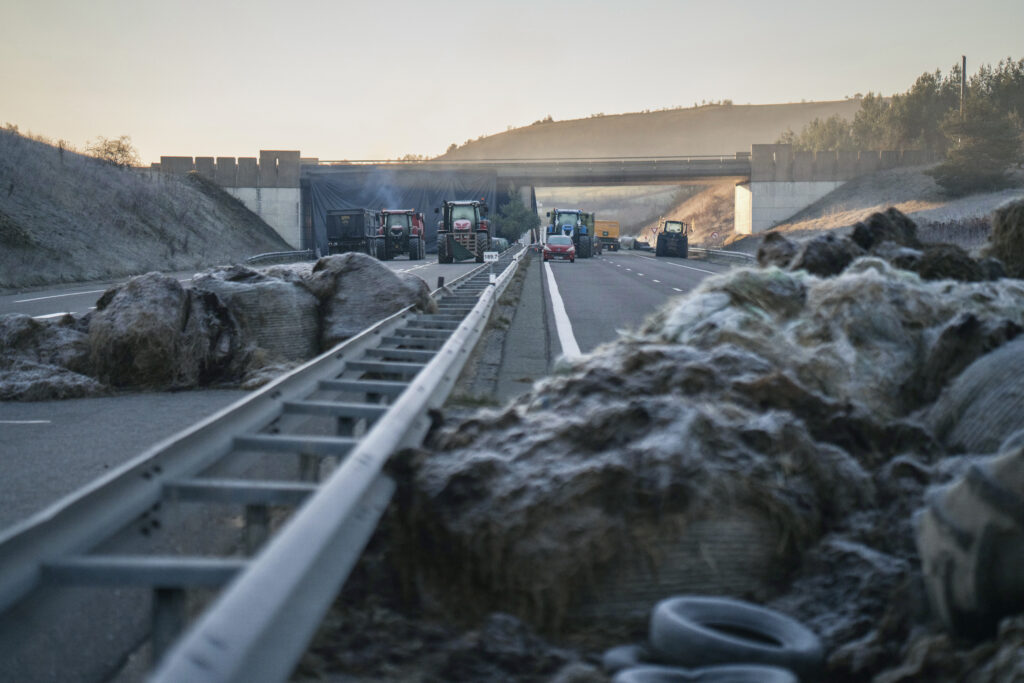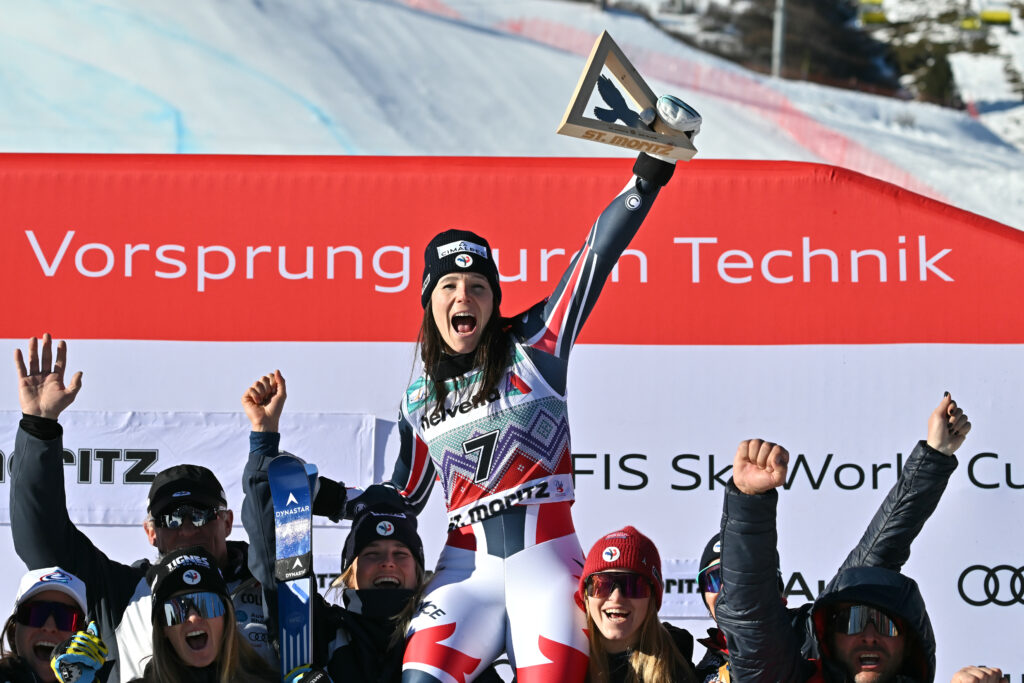Italie: l’AC Milan contrarié à domicile
L’AC Milan a laissé filer deux points devant son public en se contentant d’un match nul (2-2) contre Sassuolo dimanche lors de la 15e journée du Championnat d’Italie.Coleader de la Serie A avec le Napoli avant le coup d’envoi, le Milan est certes passé seul en tête (32 pts), mais il peut être dépassé par le champion en titre (2e, 31 pts) qui se déplace à Udine (15h00) et par l’Inter Milan (3e, 30 pts), opposé en fin d’après-midi (18h00) au Genoa.Le dimanche des Rossoneri a mal débuté et a tout aussi mal fini. Ils ont concédé un but dès la 13e minute et se sont fait surprendre par Armand Laurienté (77e).Entre-temps, l’équipe de Massimiliano Allegri a égalisé, puis mené. Elle est revenue à la hauteur de Sassuolo à la 34e minute grâce à Davide Bartesaghi. Le défenseur de 19 ans a ouvert son compteur en Serie A en reprenant au second poteau un centre fuyant de Ruben Loftus-Cheeks.L’international Espoirs italien a doublé la mise dès la reprise (47e), d’une superbe frappe dans un angle fermé après une ouverture en pivot de Christopher Nkunku.L’AC Milan, dont deux buts ont été annulés, aurait pu perdre encore plus gros sans un arrêt de Mike Maignan devant Laurienté (88e).”On a fait un bon match. On peut penser qu’on a perdu deux points, je pense moi qu’on a gagné un point qui pourrait être important”, a analysé Allegri sur la plateforme DAZN.”Il faut qu’on s’améliore encore, car on encaisse trop de buts (…) Mais on est dans les quatre premiers, c’est notre objectif de début de saison”, a-t-il ajouté.L’AC Milan, comme l’Inter, Bologne et Naples, sera dispensé de championnat le week-end prochain, car ils disputeront la Supercoupe d’Italie en Arabie saoudite, du 18 au 22 décembre.
Allemagne: les start-up de la défense réclament un virage technologique
Déterminé à faire de l’Allemagne la première force militaire conventionnelle d’Europe, le gouvernement compte largement sur ses traditionnels géants industriels, mais pour les start-up du secteur, Berlin doit au plus vite effectuer un vrai virage vers les drones high-tech. Le chancelier Friedrich Merz a promis des centaines de milliards d’euros d’investissements afin de répondre à la fois à la menace russe, jugée évidente depuis l’invasion de l’Ukraine, et aux Etats-Unis qui ne veulent plus financer des pans entiers de la sécurité européenne. Pour les jeunes pousses de la tech, si le conflit en Ukraine a illustré une chose, c’est que le progrès technologique en matière de drones est devenu le nerf de la guerre.Que ce soit pour frapper, larguer des projectiles, ravitailler ou espionner, ces appareils autonomes et sans pilote sont relativement bon marché. Ils sont capables de détruire des systèmes adverses bien plus chers, en ne risquant que les vies de l’ennemi. Et leur efficacité et leur autonomie vont s’accroître avec les avancées de l’intelligence artificielle.Chez leurs fabricants, on espère que le gouvernement allemand va réaliser le caractère révolutionnaire de ces technologies, et les placer au centre de l’armée de demain.”Clairement, on a accordé une importance excessive aux systèmes traditionnels”, assène auprès de l’AFP Gundbert Scherf, cofondateur de Helsing, start-up allemande lancée en 2021 qui livre des drones d’attaque à l’Ukraine.- Aller plus vite -“J’espère que les normes des dépenses vont changer, qu’on passera d’un ratio de 99% pour les systèmes traditionnels et 1% pour les systèmes autonomes, à quelque chose de plus équilibré”, poursuit le responsable de la société dont la valeur a été estimé à 12 milliards d’euros.Stark, autre nouveau venu fondé l’an dernier, reconnaît un progrès mais pointe aussi les lenteurs actuelles. “L’approvisionnement (militaire) en Allemagne est en train de changer, et ça c’est vraiment positif”, explique Josef Kranawetvogl, un haut responsable de Stark, qui compte parmi ses investisseurs le milliardaire controversé de la Silicon Valley, Peter Thiel, proche de Donald Trump. “Nous sommes très bons en Europe pour écrire des documents stratégiques, mais il nous faut plus de mise en oeuvre, on doit rester dans la course, on doit aller plus vite”, dit-il.Face à ces nouveaux venus, on trouve les poids lourds de l’industrie de l’armement, qui emploient des dizaines de milliers de personnes et sont ancrés depuis des décennies dans le paysage politico-économique allemand.Le PDG de Rheinmetall, numéro un du secteur dont l’activité a été fortement stimulée avec la guerre en Ukraine, estime que le temps de l’armement traditionnel n’est pas révolu.Selon lui, il faudra de tout : des drones high-tech certes, que son groupe produit d’ailleurs, mais également beaucoup de chars, de canons, de munitions classiques.”Sans véhicules blindés, il est impossible de défendre un pays ou de repousser un agresseur”, a jugé Armin Papperberger lors d’une rencontre récente avec des journalistes étrangers à laquelle un journaliste de l’AFP participait.Pour lui, une guerre impliquant l’Otan “serait très différente de ce qu’on voit actuellement en Ukraine”. “Les drones y joueraient un rôle moins significatif qu’actuellement”, se risque-t-il à prévoir. Côté gouvernement, les chiffres parlent d’eux-mêmes. Le ministre de la Défense a évoqué 10 milliards d’euros d’investissements dans les drones dans les prochaines années. Or, selon des documents auxquels le site Politico a eu accès, l’enveloppe des dépenses prévues pour 2024-2034 est de 377 milliards d’euros. Dont quelque 88 milliards pour des sociétés dans l’orbite de Rheinmettall. Un porte-parole du ministère allemand de la Défense n’a pas souhaité commenter ces chiffres, mais défend les armements traditionnels.- Armes de la dernière guerre -Pour lui, les drones sont “décisifs dans le combat”, mais a eux seuls ils ne font pas la différence dans une guerre.”Les chars d’assaut, les transports de troupes blindés et les avions de combat seront toujours nécessaires”, juge ce porte-parole, qui ne souhaite pas être identifié conformément à la politique de son ministère. Pour certains observateurs extérieurs, l’Allemagne risque de rater une révolution technologique, son armée ayant déjà connu son lot de scandales d’équipements obsolètes ou inadaptés.La “planification (des militaires) est à la traîne par rapport à l’essor inexorable des systèmes autonomes et sans pilote”, ont récemment écrit l’historien britannique Niall Ferguson et Moritz Schularick, président de l’Institut IfW Kiel.Pour eux, l’Allemagne doit prendre garde à ne pas se retrouver avec “les armes de la dernière guerre, au lieu de celles de la prochaine”.
Dermatose: la présidente d’Occitanie Carole Delga en appelle à Lecornu
Carole Delga, présidente socialiste de la région Occitanie, désormais épicentre de l’épizootie de dermatose bovine et de la colère agricole en résultant, a appelé dimanche le Premier ministre Sébastien Lecornu à “intervenir” pour instaurer un “dialogue” avec les éleveurs.Dans une lettre ouverte, elle a estimé “qu’il [était] temps pour [M. Lecornu] d’intervenir afin de garantir, dans les plus brefs délais, un dialogue franc et sincère avec les agriculteurs de ce pays, seul à même d’apaiser les tensions qui ne cessent de s’aggraver dans de nombreux départements”.Mme Delga a décrit dans son courrier “l’indignation et la colère” qui croissent “inexorablement face au désespoir d’un peuple. Elles sont à la mesure du choc ressenti par toute une profession et, au-delà, par la population, quant à la gestion gouvernementale de la dermatose nodulaire”, martèle-t-elle.D’abord touchée dans les Pyrénées-Orientales par cette maladie, dont le premier foyer connu en France a été détecté en juin en Savoie, l’Occitanie compte désormais des cas dénombrés en Ariège, en Haute-Garonne et dans les Hautes-Pyrénées.Mobilisés notamment à l’appel de la Coordination rurale et de la Confédération paysanne, opposées à l’abattage total des troupeaux où des cas sont détectés, des agriculteurs ont mené de nombreuses actions depuis jeudi, dont des blocages sur l’A64, l’A75 et plusieurs routes nationales.Sur le campement à Carbonne (Haute-Garonne) sur l’A64, une centaine d’agriculteurs rassemblés dimanche à la mi-journée, partagent entre deux bottes de taille de la daube de joues avec des pommes de terre au barbecue. Certains comme Cédric Baron, éleveur de bovins y ont passé la nuit: “Le programme pour nous c’est de rester ici”, dit-il à l’AFP. “On a sept revendications, la dermatose c’est ce qui nous a tous fait bondir, mais ici à Carbonne il n’y a pas que des éleveurs, il y a aussi des céréaliers avec d’autres problématiques, donc on le sait, on ne lèvera pas le camp comme çà”.A Séverac-d’Aveyron, sur l’A75, où une poignée d’agriculteurs a passé la nuit, beaucoup ont rejoint une manifestation à Millau, la sous-préfecture de ce département de l’Aveyron, avec le mot d’ordre “tous ensemble, pour sauver nos vaches et éleveurs”.Dans le Tarn, une cinquantaine d’agriculteurs bloquent la nationale N88, où ils ont déversé du lisier à l’entrée de la rocade d’Albi, a constaté une correspondante de l’AFP.”Ce n’est pas normal qu’il y ait un abattage massif alors que des gens meurent de faim. La ministre doit remettre du bon sens”, a estimé Gilles Albinet, 58 ans, exploitation de bovins à Arthès.”Nous sommes en guerre. Tant que l’Etat ne renoncera pas à l’abattage massif, on sera là”, a quant à lui prévenu Cédric Nespoulos, 46 ans, producteur de bovins viande à Sérénac, bonnet de la Coordination rurale sur la tête. Avant d’ajouter: “On se battra ensuite contre le Mercosur.”A Millau, une vingtaine de tracteurs très chargés déversent lisier, foin, pneus et ordures devant et dans la cour de la sous-préfecture de l’Aveyron, selon un photographe de l’AFP.Enfin, à Tarascon-sur-Ariège, une centaine d’agriculteurs bloquent le rond-point de Sabart, où la N20 poursuit sa route vers le Pas-de-la-Case et l’entrée en Andorre, a indiqué à l’AFP Sébastien Durand, président de la CR Ariège.Plusieurs associations de maires d’Ariège ont par ailleurs appelé à se rendre à Foix à midi lundi pour y remettre un courrier de doléance au préfet appelant notamment à modifier le protocole sanitaire de gestion de la DNC, a appris un correspondant de l’AFP.cor-vgr-chv-gm/mpm
Une attaque contre une fête juive fait 11 morts à Sydney
Deux individus ont ouvert le feu dimanche sur une foule qui célébrait la fête juive de Hanouka sur la célèbre plage de Bondi à Sydney, en Australie, faisant 11 morts et 29 blessés, selon les autorités.L’un des deux auteurs de l’attaque a en outre été tué et l’autre, blessé, se trouve dans un état critique, a indiqué la police de l’Etat de Nouvelle-Galles-du-Sud.”Cette attaque visait la communauté juive de Sydney le premier jour de Hanouka”, fête juive qui était célébrée à ce moment-là sur la plage, a déclaré lors d’une conférence de presse le Premier ministre de l’Etat, Chris Minns.Il s’agit d’un “acte terroriste”, a affirmé le chef de la police de l’Etat, Mal Lanyon. “Nous avons découvert un engin explosif artisanal dans une voiture liée au criminel décédé”, a-t-il ajouté.Selon la police, l’attaque a eu lieu dimanche vers 18H45 (07H45 GMT) sur la plage de Bondi, la plus célèbre d’Australie, habituellement très fréquentée pendant le week-end par des foules de promeneurs, de nageurs et de surfeurs.”Nous avons entendu les coups de feu. C’était choquant (…) dix minutes de détonations incessantes. On aurait dit une arme puissante”, a déclaré à l’AFP sur les lieux Camilo Diaz, un étudiant chilien de 25 ans.”Il y a eu une fusillade, deux tireurs vêtus de noir et armés de fusils semi-automatiques”, a déclaré à l’AFP un autre témoin, Timothy Brant-Coles, un touriste britannique.”Le mal s’est déchaîné sur la plage de Bondi au-delà de tout entendement”, a affirmé le Premier ministre Australien Anthony Albanese, qui a salué les “héros” qui sont intervenus lors de l’attaque pour tenter de maîtriser les meurtriers.- “Héros” -Le Premier ministre de Nouvelle-Galles-du-Sud a notamment cité le cas d’un passant s’étant précipité sur un des attaquants et parvenant à lui arracher à mains nues son fusil.”Il s’agit d’une attaque ciblée contre les juifs australiens le premier jour de Hanouka, qui devrait être un jour de joie, une célébration de la foi – un acte malveillant, antisémite et terroriste qui a frappé le coeur de notre nation”, a poursuivi M. Albanese. “Une attaque contre les juifs australiens est une attaque contre tous les Australiens”, a-t-il ajouté.”En ce moment même, nos frères et soeurs de Sydney, en Australie, ont été attaqués par d’ignobles terroristes dans une attaque très cruelle contre des juifs qui s’étaient rendus à Bondi Beach pour allumer la première bougie de Hanouka”, a déploré le président israélien Isaac Herzog dans un discours prononcé lors d’un événement à Jérusalem.Il s’agit d’une “tragédie, mais tout à fait prévisible”, a dénoncé auprès de l’AFP le chef de l’Association juive d’Australie, Robert Gregory, ajoutant que le gouvernement australien “a été averti à maintes reprises, mais n’a pas pris les mesures adéquates pour protéger la communauté juive”.Sur la colline verdoyante surplombant la plage, un journaliste de l’AFP a vu de nombreux objets abandonnés dans la panique par les personnes fuyant la fusillade, dont une poussette d’enfant. La télévision nationale ABC a montré des images de plusieurs personnes gisant dans l’herbe près de la plage, ainsi que d’un fusil posé contre un tronc d’arbre. Il y avait “du sang partout”, a déclaré à ABC un habitant du quartier, Harry Wilson.Le Conseil national des imams australien a condamné cette “attaque traumatisante”. “C’est le moment pour tous les Australiens, y compris la communauté musulmane australienne, de se serrer les coudes dans l’unité, la compassion et la solidarité”, a ajouté cette organisation.- “Du sang partout” -Le président ukrainien Volodymyr Zelensky a exprimé sur X la “solidarité” de son pays “face à la brutale attaque terroriste (…) qui visait la communauté juive au début de Hanouka”.La France “partage la douleur du peuple australien et continuera de lutter sans faiblesse contre la haine antisémite qui nous meurtrit tous, partout où elle frappe”, a écrit sur X le président français Emmanuel Macron.Le Premier ministre britannique Keir Starmer a qualifié l’attaque de “répugnante” sur X ajoutant que “le Royaume-Uni sera toujours aux côtés de l’Australie et de la communauté juive”.”L’Europe est aux côtés de l’Australie et des communautés juives partout. Nous sommes unis contre la violence, l’antisémitisme et la haine”, a écrit la présidente de la Commission européenne Ursula von der Leyen.Une série d’attaques antisémites a semé la peur parmi les communautés juives d’Australie depuis l’attaque du Hamas contre Israël le 7 octobre 2023 et la guerre qui s’en est suivie à Gaza. Le gouvernement australien a accusé l’Iran d’être à l’origine de deux de ces attaques et a expulsé l’ambassadeur de Téhéran il y a près de quatre mois. Aucune victime n’avait été signalée lors de ces deux attaques.
Dermatose: la pression monte dans le Sud-Ouest, à la veille d’une visite de Genevard
Manifestations et barrages dans tout le Sud-Ouest, dont le blocage de Bordeaux dimanche soir: des éleveurs de bovins font monter la pression, avant la venue lundi en Occitanie de la ministre de l’Agriculture, dont ils contestent la gestion de la dermatose nodulaire contagieuse (DNC).”Il y a des nouveaux blocages en cours (…) ça continue et ça se développe”, a déclaré à l’AFP Bertrand Venteau, président de la Coordination rurale, très remontée, comme la Confédération paysanne, contre l’abattage généralisé des bêtes des foyers affectés et pour exiger une large vaccination du cheptel français de 16 millions de bovins contre cette maladie non transmissible à l’homme.Sur l’A64, bloquée depuis vendredi soir par des dizaines de tracteurs sur plus d’une centaine de kilomètres du Pays basque à l’est de Tarbes, des agriculteurs ont installé des sapins de Noël en signe de leur volonté de durer. “On est partis pour passer les fêtes ici”, “on ne lèvera pas le camp comme ça,” a déclaré à l’AFP Cédric Baron, agriculteur-éleveur de bovins à Montoussin (Haute-Garonne), mobilisé à Carbonne, point de départ d’un précédent mouvement de protestation agricole en janvier 2024. “Nous sommes en guerre. Tant que l’Etat ne renoncera pas à l’abattage massif, on sera là”, prévient Cédric Nespoulos, producteur de bovins viande, dans le Tarn où une cinquantaine d’agriculteurs bloquent la nationale N88 à l’entrée de la rocade d’AlbiA Millau, une vingtaine de tracteurs ont déversé lisier, foin, pneus et ordures devant et dans la cour de la sous-préfecture de l’Aveyron, selon un photographe de l’AFP.D’autres agriculteurs se mobilisent près de Montpellier ou à Saint-Jean-de-Luz (Pyrénées-Atlantiques), en attendant de nouveaux appels au blocage en soirée à Bordeaux et en Dordogne.- “Aucun foyer actif” -Sur les barrages, beaucoup de militants se disent “choqués” par les images des gaz lacrymogènes utilisés par les gendarmes en milieu de semaine en Ariège pour disperser les éleveurs qui bloquaient aux vétérinaires l’accès à la ferme touchée par le premier cas de DNC dans cette partie du pays.”Quand il y a une bête malade, tout le monde est d’accord pour l’abattre, mais tuer des troupeaux entiers, alors qu’il faut des années pour monter une génétique et monter un troupeau, on est totalement contre”, a déclaré à l’AFP Christophe Guénon, éleveur de vaches et maraîcher en bio, près de Bordeaux.La ministre de l’Agriculture, Annie Genevard, soutenue sur ce dossier par l’alliance syndicale majoritaire FNSEA-Jeunes Agriculteurs, défend “un protocole qui a très bien fonctionné”, depuis l’apparition du premier cas en France de cette maladie, en juin, en Savoie. Elle a assuré samedi au journal Sud Ouest qu’il n’y avait “aucun foyer actif de DNC sur le territoire français”. Alors que M. Venteau estime que “c’est maintenant que la vaccination doit se décréter, sinon on va avoir un drame dans moins d’un mois” et “tout le sud de la Loire sera contaminé”, la ministre a répondu dimanche sur Europe 1 que “le virus n’est pas aux portes de chaque élevage”.- Delga interpelle Lecornu -Lundi, elle se rendra en Occitanie pour “assister aux débuts de la vaccination sur ce territoire” pour un million de bêtes, “parce que c’est le chemin pour lutter contre la maladie”, mais le gouvernement reste très prudent quant à une possible généralisation de la vaccination.”Si on vaccinait tout le cheptel, ça placerait la France comme une zone à risque et donc ça ferait peser un risque économique sur toute la filière agricole”, a plaidé dimanche Sébastien Martin, ministre délégué chargé de l’Industrie, invité du “Grand Jury” RTL/M6/Le Figaro/Public Sénat.La présidente socialiste de la région Occitanie, Carole Delga, a adressé dimanche une lettre ouverte au Premier ministre Sébastien Lecornu, jugeant “qu’il [était] temps pour [lui] d’intervenir afin de garantir, dans les plus brefs délais, un dialogue franc et sincère avec les agriculteurs de ce pays”.Outre la gestion sanitaire de la crise actuelle, d’autres dossiers brûlants comme les accords commerciaux du Mercosur et la baisse annoncée du budget de la Politique agricole commune (PAC) européenne alimentent la colère des agriculteurs.kal-mla-gm-chv-vgr-dac/gf/er
Dermatose: la pression monte dans le Sud-Ouest, à la veille d’une visite de Genevard
Manifestations et barrages dans tout le Sud-Ouest, dont le blocage de Bordeaux dimanche soir: des éleveurs de bovins font monter la pression, avant la venue lundi en Occitanie de la ministre de l’Agriculture, dont ils contestent la gestion de la dermatose nodulaire contagieuse (DNC).”Il y a des nouveaux blocages en cours (…) ça continue et ça se développe”, a déclaré à l’AFP Bertrand Venteau, président de la Coordination rurale, très remontée, comme la Confédération paysanne, contre l’abattage généralisé des bêtes des foyers affectés et pour exiger une large vaccination du cheptel français de 16 millions de bovins contre cette maladie non transmissible à l’homme.Sur l’A64, bloquée depuis vendredi soir par des dizaines de tracteurs sur plus d’une centaine de kilomètres du Pays basque à l’est de Tarbes, des agriculteurs ont installé des sapins de Noël en signe de leur volonté de durer. “On est partis pour passer les fêtes ici”, “on ne lèvera pas le camp comme ça,” a déclaré à l’AFP Cédric Baron, agriculteur-éleveur de bovins à Montoussin (Haute-Garonne), mobilisé à Carbonne, point de départ d’un précédent mouvement de protestation agricole en janvier 2024. “Nous sommes en guerre. Tant que l’Etat ne renoncera pas à l’abattage massif, on sera là”, prévient Cédric Nespoulos, producteur de bovins viande, dans le Tarn où une cinquantaine d’agriculteurs bloquent la nationale N88 à l’entrée de la rocade d’AlbiA Millau, une vingtaine de tracteurs ont déversé lisier, foin, pneus et ordures devant et dans la cour de la sous-préfecture de l’Aveyron, selon un photographe de l’AFP.D’autres agriculteurs se mobilisent près de Montpellier ou à Saint-Jean-de-Luz (Pyrénées-Atlantiques), en attendant de nouveaux appels au blocage en soirée à Bordeaux et en Dordogne.- “Aucun foyer actif” -Sur les barrages, beaucoup de militants se disent “choqués” par les images des gaz lacrymogènes utilisés par les gendarmes en milieu de semaine en Ariège pour disperser les éleveurs qui bloquaient aux vétérinaires l’accès à la ferme touchée par le premier cas de DNC dans cette partie du pays.”Quand il y a une bête malade, tout le monde est d’accord pour l’abattre, mais tuer des troupeaux entiers, alors qu’il faut des années pour monter une génétique et monter un troupeau, on est totalement contre”, a déclaré à l’AFP Christophe Guénon, éleveur de vaches et maraîcher en bio, près de Bordeaux.La ministre de l’Agriculture, Annie Genevard, soutenue sur ce dossier par l’alliance syndicale majoritaire FNSEA-Jeunes Agriculteurs, défend “un protocole qui a très bien fonctionné”, depuis l’apparition du premier cas en France de cette maladie, en juin, en Savoie. Elle a assuré samedi au journal Sud Ouest qu’il n’y avait “aucun foyer actif de DNC sur le territoire français”. Alors que M. Venteau estime que “c’est maintenant que la vaccination doit se décréter, sinon on va avoir un drame dans moins d’un mois” et “tout le sud de la Loire sera contaminé”, la ministre a répondu dimanche sur Europe 1 que “le virus n’est pas aux portes de chaque élevage”.- Delga interpelle Lecornu -Lundi, elle se rendra en Occitanie pour “assister aux débuts de la vaccination sur ce territoire” pour un million de bêtes, “parce que c’est le chemin pour lutter contre la maladie”, mais le gouvernement reste très prudent quant à une possible généralisation de la vaccination.”Si on vaccinait tout le cheptel, ça placerait la France comme une zone à risque et donc ça ferait peser un risque économique sur toute la filière agricole”, a plaidé dimanche Sébastien Martin, ministre délégué chargé de l’Industrie, invité du “Grand Jury” RTL/M6/Le Figaro/Public Sénat.La présidente socialiste de la région Occitanie, Carole Delga, a adressé dimanche une lettre ouverte au Premier ministre Sébastien Lecornu, jugeant “qu’il [était] temps pour [lui] d’intervenir afin de garantir, dans les plus brefs délais, un dialogue franc et sincère avec les agriculteurs de ce pays”.Outre la gestion sanitaire de la crise actuelle, d’autres dossiers brûlants comme les accords commerciaux du Mercosur et la baisse annoncée du budget de la Politique agricole commune (PAC) européenne alimentent la colère des agriculteurs.kal-mla-gm-chv-vgr-dac/gf/er
Super-G de Saint-Moritz: Miradoli deuxième, sur les talons de Robinson
Deuxième d’un souffle, la Française Romane Miradoli a signé dimanche son premier podium depuis mars, le sixième de sa carrière en Coupe du monde, en terminant à huit centièmes de la Néo-Zélandaise Alice Robinson dans le super-G de Saint-Moritz (Suisse).Sur un tracé technique, tout en dévers et mouvements de terrain, la Haut-Savoyarde de 31 ans devance de 11/100es l’Italienne Sofia Goggia, déjà troisième de la descente samedi. Laura Gauché prend elle la cinquième place derrière l’Américaine Lindsey Vonn, à 38/100e de Robinson.A l’aise sur la “Corviglia”, où elle avait terminé 6e vendredi de la première descente remportée par Lindsey Vonn, puis 15e samedi de la seconde, Miradoli confirme les promesses du printemps dernier après un hiver de doutes.”Je me sens super bien, c’est cool de commencer la saison de super-G comme ça”, s’est réjouie la native de Samoëns, seule Bleue sur un podium de ski alpin de toute la saison dernière avec sa troisième place en mars dans le super-G de La Thuile (Italie).- Premier sacre en super-G pour Robinson -Miradoli, qui avait confié à l’AFP avoir un temps envisagé d’arrêter avant de retrouver l’envie de “s’éclater” à l’approche des JO de Milan Cortina (6-22 février), est passée tout près de décrocher un deuxième succès après le super-G de Lenzerheide en mars 2022.”Je suis quand même un peu “dég'” des huit centièmes”, a-t-elle reconnu. “J’ai réussi à m’engager, mais je fais une petite faute en haut qui, je pense, me coûte la victoire”.Dimanche matin, elle a profité des conditions météo parfaites pour prendre des risques, là où d’autres concurrentes dont Lindsey Vonn ont attaqué la piste plus prudemment – peut-être échaudées par le quart d’heure de retard pour raboter un saut trop prononcé, ou par la chute de l’Allemande Emma Aicher, victorieuse la veille en descente.”Après le passage des deux premières, je me suis dit +OK, on peut attaquer plus que prévu+”, a expliqué la Française à Eurosport.Partie juste avant la Haut-Savoyarde, Alice Robinson a de son côté remporté sa première victoire en vitesse – et même son premier podium -, elle qui compte déjà à 24 ans six victoires en géant, dont deux cette saison.”Je cours en super-G depuis environ cinq ans et je n’avais encore jamais réussie à poser une vraie bonne manche du début à la fin, il manquait toujours des morceaux”, a raconté la vice-championne du monde de géant à la chaîne suisse SRF.- Shiffrin se teste -Pour “enfin laisser filer les skis”, ce phénomène de précocité, victorieuse dès 17 ans en Coupe du monde, a réussi à “combiner” les repérages pendant ses entraînements de descente et une sûreté dans les courbes née de sa confiance en géant.La dernière épreuve de l’étape grisonne marquait aussi le retour à la vitesse de Mikaëla Shiffrin pour la première fois depuis sa lourde chute en janvier 2024 dans la descente de Cortina (entorse au genou gauche).Pour ce test en vue des JO-2026 sur cette même piste de Cortina, la championne aux 104 couronnes en Coupe du monde a manqué la toute dernière porte après une manche où elle accusait moins d’une seconde de retard, en s’élançant avec le dossard 31.C’était aussi la première fois qu’elle croisait sur une course Lindsey Vonn, l’autre légende américaine aux 83 succès, depuis le super-G des Mondiaux d’Are en février 2019: Shiffrin l’avait remporté et Vonn était sortie de piste, quelques jours avant de mettre fin à sa première carrière.Impériale en slalom avec trois succès en trois courses cette saison, Mikaela Shiffrin conserve néanmoins la tête du classement général avec 64 points d’avance sur Alice Robinson.

